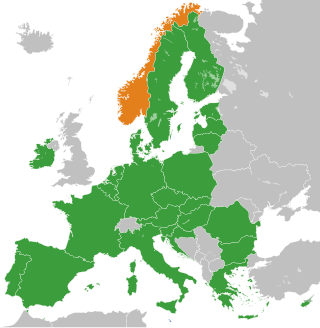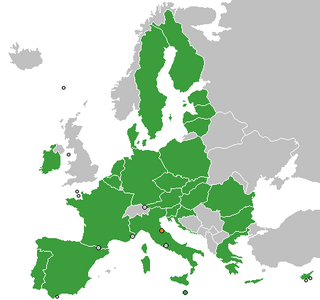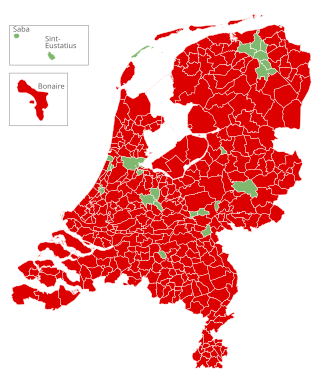
The European Free Trade Association (EFTA) is a regional trade organization and free trade area consisting of four European states: Iceland, Liechtenstein, Norway and Switzerland. The organization operates in parallel with the European Union (EU), and all four member states participate in the European Single Market and are part of the Schengen Area. They are not, however, party to the European Union Customs Union.

Iceland is heavily integrated into the European Union via the Agreement on the European Economic Area and the Schengen Agreement, despite its status as a non-EU member state. Iceland applied for membership in 2009 but the application was controversial and the Minister of Foreign Affairs sent a letter in 2015 ending the application process.
Romania does not allow same-sex marriage or civil unions. In June 2018, the European Court of Justice ruled that under certain circumstances same-sex spouses of European Union citizens should be granted a right of residency in Romania. The Constitution of Romania does not define marriage directly, but Article 48 of the Constitution defines marriages between "spouses" as the foundation of the family.

This is a list of referendums related to the European Union, or referendums related to the European Communities, which were predecessors of the European Union. Since 1972, a total of 48 referendums have been held by EU member states, candidate states, and their territories, with several additional referendums held in countries outside the EU. The referendums have been held most commonly on the subject of whether to become a member of European Union as part of the accession process, although the EU does not require any candidate country to hold a referendum to approve membership or as part of treaty ratification. Other EU-related referendums have been held on the adoption of the euro and on participation in other EU-related policies.
Same-sex marriage has been legal in Switzerland since 1 July 2022. Legislation to open marriage to same-sex couples passed the Swiss Parliament in December 2020. The law was challenged in a referendum on 26 September 2021 by opponents of same-sex marriage and was approved with the support of 64% of voters and a majority in all 26 cantons. The law went into force on 1 July 2022. A provision of the law permitting same-sex marriages performed abroad to be recognised in Switzerland took effect on 1 January 2022.
Liechtenstein has recognized same-sex registered partnerships since 1 September 2011 following approval by voters in a referendum. Liechtenstein was the second country in the world to pass a partnership law by referendum, after Switzerland in 2005.
Lithuania does not recognise same-sex marriages or civil unions. A bill to grant same-sex couples some limited legal rights and benefits is pending in the Seimas.
Same-sex marriage has been legal in Estonia since 1 January 2024. The government elected in the March 2023 election, led by Prime Minister Kaja Kallas and consisting of the Reform Party, the Social Democrats and Estonia 200, vowed to legalize same-sex marriage. Legislation to open marriage to same-sex couples was introduced to the Riigikogu in May 2023, and was approved in a final reading by 55 votes to 34 on 20 June. It was signed into law by President Alar Karis on 27 June, and took effect on 1 January 2024. Estonia was the first Baltic state and the 20th country in Europe to legalise same-sex marriage.

Norway is not a member state of the European Union (EU). However, it is associated with the Union through its membership of the European Economic Area (EEA), signed in 1992 and established in 1994. Norway was a founding member of the European Free Trade Association (EFTA) in 1960, which was originally set up as an alternative to the European Economic Community (EEC), the main predecessor of the EU. Norway had considered joining both the EEC and the European Union, but opted to decline following referendums in 1972 and 1994. According to the European Social Survey conducted in 2018, 73.6% of Norwegians would vote 'No' in a referendum to join the European Union. Norway borders two EU member states, namely Finland and Sweden.

The most recent enlargement of the European Union saw Croatia become the European Union's 28th member state on 1 July 2013. The country applied for EU membership in 2003, and the European Commission recommended making it an official candidate in early 2004. Candidate country status was granted to Croatia by the European Council in mid-2004. The entry negotiations, while originally set for March 2005, began in October that year together with the screening process.

Switzerland is not a member state of the European Union (EU). It is associated with the Union through a series of bilateral treaties in which Switzerland has adopted various provisions of European Union law in order to participate in the Union's single market, without joining as a member state. Among Switzerland's neighbouring countries, all but one are EU member states.

In general, the law of the European Union is valid in all of the twenty-seven European Union member states. However, occasionally member states negotiate certain opt-outs from legislation or treaties of the European Union, meaning they do not have to participate in certain policy areas. Currently, three states have such opt-outs: Denmark, Ireland and Poland. The United Kingdom had four opt-outs before leaving the Union.

A referendum on European Union membership was held in Malta on 8 March 2003. The result was 54% in favour. The subsequent April 2003 general elections were won by the Nationalist Party, which was in favour of EU membership, the opposition Labour Party having opposed joining. Malta joined the EU on 1 May 2004.
Eight referendums were held in Switzerland during 2009. The first was held on 8 February on extending the freedom of movement for workers from Bulgaria and Romania. The next two were held on 17 May 2009 on introducing biometric passports and the "Future with complementary medicine" proposal. A further two were held on 27 September on increasing VAT and the introduction of public initiatives. The final three were held on 29 November on banning the construction of new minarets, exporting weapons and the use of aviation fuel taxation.
Slovakia does not recognise same-sex marriage or civil unions. The Constitution of Slovakia has limited marriage to opposite-sex couples since 2014. Bills to recognise same-sex civil partnerships have been introduced several times, most recently in 2023, but all have been rejected. However, there is some legal recognition for unregistered cohabiting same-sex couples; limited rights for a "close person" are recognised under civil and penal law.

Relations between the Republic of San Marino and the European Union (EU) began in February 1983. San Marino is completely surrounded by one EU member state, Italy.
A referendum is a direct vote in which an entire electorate is asked to either accept or reject a particular proposal. This article summarises referendum laws and practice in various countries.

An advisory referendum on the approval of the Ukraine–European Union Association Agreement was held in the Netherlands on 6 April 2016. The referendum question was: "Are you for or against the Approval Act of the Association Agreement between the European Union and Ukraine?"
Several federal referendums were held in Switzerland in 2020, with voting on 9 February, 27 September and 29 November. Voting was also planned for 17 May, but was postponed due to the COVID-19 pandemic.
Federal referendums were held in Switzerland on 7 March, 13 June, 26 September, and 28 November 2021. Swiss referendums take three forms: popular initiatives, which are citizen proposals to create a new law and require 100,000 valid signatures on a petition to get on the ballot; facultative or optional referendums, which are citizen proposals to approve or reject a piece of existing law and require 50,000 valid signatures on a petition to get on the ballot; and mandatory referendums, which are required to revise the constitution, join an international organisation or introduce emergency federal legislation for over a year.











